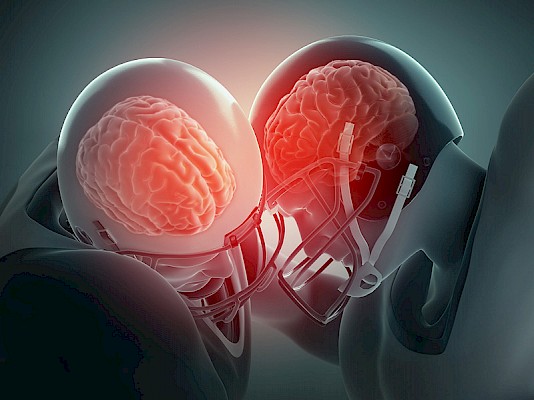 by Dr. Asma Khan
by Dr. Asma Khan
Millions of Americans suffer a recreation-related concussion every year. Football, baseball, hockey, and many other organized sports put athletes at a particularly high risk. Having several concussions over time may result in permanent brain damage, especially if left untreated. So, let’s talk a little bit about how to recognize and treat a concussion.
What Is a Concussion?
A concussion is a type of traumatic brain injury caused by a bump, blow, or jolt to the head, or by a hit to the body that causes the head and brain to move quickly back and forth. The sudden movement can cause the brain to bounce around in the skull, creating chemical changes in the brain, and sometimes stretching and damaging brain cells.
Signs and Symptoms
Signs and symptoms of a concussion usually occur very soon after the injury. However, you may not realize how serious the injury is at first, as some symptoms may not arise for hours or even days. Common symptoms include:
- Headache or pressure in the head
- Nausea or vomiting
- Problems with balance or dizziness
- Double or blurry vision
- Sensitivity to light or noise
- Feeling sluggish, dazed, or stunned
- Confusion or memory problems
- Visual or auditory disruptions
What to Do
If you think you may have a concussion, it is very important to see a doctor. For the symptoms listed above, you can be treated at HRHCare Urgent Care, or any urgent care center.
If a head injury results in loss of consciousness, seizures, prolonged confusion, amnesia, neck pain, or numbness or weakness in the arms and legs, you should go to the hospital ER immediately. Other symptoms of more serious brain injury include:
- One pupil larger than the other
- Severe drowsiness or inability to wake up
- Headaches that grow gradually worse
- Slurred speech or decreased coordination
- Unusual behavior or agitation
- Having had multiple past concussions
Concussions: What You Need to Know
If you have a concussion, it is very important to allow yourself to fully recover through rest and limiting your activities. If your symptoms get worse, report them to your doctor right away so you can undergo further testing and analysis. Talk to your doctor about when you should return to your normal activities, and how to deal with challenges you may encounter during your recovery.
If you think there may be a chance you have a concussion, always head straight to the doctor. And remember to be safe when playing sports or engaging in any physical activities this spring!

About Dr. Asma Khan
Asma Khan, MD is a family medicine physician and the Clinical Director of HRHCare Urgent Care Nyack. Holding both an MBBS and MD degree from the Allama Iqbal Medical College in Lahore, Pakistan, she completed her family medicine internship and residency at the Wyckoff Heights Medical Center in Brooklyn. Prior to joining the HRHCare family, she served patients at MedExcell Urgent Care, the NY Walk-In Medical Group and Palm Desert Urgent Care.
For more information on HRHCare, visit www.hrhcare.org.
See also:
- It’s Time for Back-to-School Check-Ups, 8/4/2019
- How to Avoid Ankle Sprains, 7/19/2019
- How to Keep Your Skin Safe This Summer, 6/29/29
- Asthma: The What and Why Behind the Wheeze, 5/11/2019
- How to Beat Seasonal Allergies, 4/13/2019
- Beware Impetigo, AKA “School Disease,” 3/10/2019
- Everything To Know About Concussions, 2/17/2019
- How to Avoid UTIs, 10/18/2018
- Back to School Check-ups Are Essential, 8/18/2018
- How To Keep Your Skin Safe During Summer, 6/24/2018








